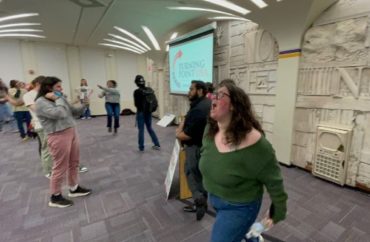
‘It feels as if we are in the midst of a society-wide mental breakdown,’ Rufo wrote
Colleges validate behaviors characterizing mental health pathologies, leading to a society dominated by narcissism and other kinds of madness.
New College of Florida trustee and activist Christopher Rufo wrote in a Sept. 24 City Journal essay that universities encourage behaviors associated with psychology’s “Cluster B” personality disorders: narcissism, borderline personality disorder, histrionic personality disorder and antisocial personality disorder.
“It feels as if we are in the midst of a society-wide mental breakdown,” Rufo wrote. Even more, “psychologists have captured the spirit of our modern culture” in categorizing these pathologies.
The four disorders are each “characterized by extreme emotional dysregulation and dramatic presentation,” according to ScienceDirect.
Rufo, who is not a psychologist, pointed to evidence that college students’ mental health in general has plummeted despite the growing armies of workers dedicated to student wellbeing.
He cited a University of Michigan “Healthy Minds” study from June 2022 that found “more than 60 percent of college students [in 2021] meet the criteria for at least one mental-health problem—a nearly 50 percent increase since 2013.”
While the decline in student mental health is well documented, Rufo argues further that certain kinds of psychologically dysfunctional conduct — specifically, “Type B” cluster-type behavior — are “now valorized and embedded in our institutions,” regardless of the number of students’ diagnoses.
Even more, universities’ affirmation of such behaviors makes students’ mental health worse, Rufo wrote.
“On campus, students are told that they are always under attack, that their safety is constantly threatened,” he wrote. “And rather than strengthen young people for the challenges of life, administrators fight to sanitize the campus environment and shut down any speech deemed ‘harmful’ or ‘offensive’—the perfect recipe for enabling and encouraging Cluster B-style narcissism and hysteria.”
Rufo calls out this regime as a “pathocracy,” meaning pathological behaviors rule universities and other institutions:
These scenes and sentiments have become ubiquitous: college students screaming and chanting their demands for maternal “care”; young adults rebelling against authority while also demanding that it resolve their “trauma”; a hothouse full of personal resentments flower and bloom under the guise of “social justice.”
At Stanford Law School, the dean of “diversity, equity, and inclusion,” working in a co-dependent manner with protesting students, disrupted the speech of a federal judge, whom she accused of causing “harm” and making her “uncomfortable”—a preposterous standard, assertable only in an environment already saturated with pathocratic assumptions.
Heather Mac Donald in an earlier City Journal essay proposed the new dominance of college female administrators “is intimately tied to the rhetoric of unsafety and victimhood.”
This is in part because “females on average score higher than males on the personality trait of neuroticism, defined as anxiety, emotional volatility, and susceptibility to depression,” Mac Donald wrote.
“When students claim to be felled by ideas that they disagree with, the feminized bureaucracy does not tell them to grow up and get a grip,” according to Mac Donald. “It validates their self-pity.”
Rufo also cites the rise of social media platforms such as TikTok in “incubating mental illness” and contributing to the rise of the “pathocracy.”
To understand and escape our culture’s particular madness, we need to study “the particular logic and rationality of the Cluster B society,” Rufo wrote.
We must promote alternatives to “Cluster B”-type behavior, according to Rufo. Instead of narcissism, histrionics, emotional instability and antisocial behavior, we must cultivate “balance, order, discipline and sanity.” If “pathocracy” replaces democracy, “our self-governing regime would be over.”
MORE: Heather Mac Donald challenges BLM student protesters at Berkeley Law
IMAGE: Twitter/@ighaworth
Like The College Fix on Facebook / Follow us on Twitter






Please join the conversation about our stories on Facebook, Twitter, Instagram, Reddit, MeWe, Rumble, Gab, Minds and Gettr.